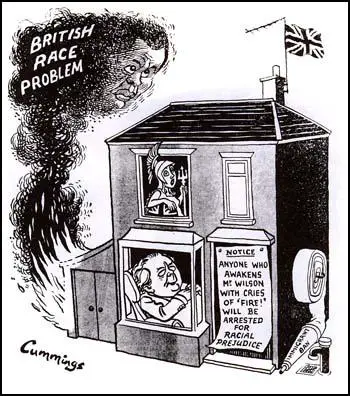Michael Cummings
Michael Cummings, the son of A. J. Cummings, the political editor of the News Chronicle, was born in Leeds on 1st June 1919. He became a cartoonist and in 1939 he had his first work published in The Tribune. During the Second World War he worked for the Daily Chronicle.
After the war he studied at Chelsea School of Art (1945-48), where he was taught by Graham Sutherland. He worked briefly at St Albans Girls' Grammar School. In 1949 he replaced Sidney Strube at The Daily Express. Cummings moved to the political right and his editor, Arthur Christiansen, commented: "He reserves most of his venom for Labour leaders. Every day he submits five or six rough outlines and I select the one which seem least cruel." Understandably, he was extremely popular with Winston Churchill who commented that "Cummings may well become one of the greatest cartoonists of our time."
Michael Cummings, Daily Chronicle (17th April 1940)
Cummings also supplied cartoons for the Sunday Express, Punch Magazine, The Daily Mail and The Times. One cartoon showing a boatload of golliwogs arriving in the UK resulted in him being described as a racist. Another cartoon that appeared on 9th July, 1967, that accompanied an article by Enoch Powell, also received a great deal of criticism.
Michael Cummings, who was one of the founders of the British Cartoonists' Association, died in London on 9th October 1997.

Primary Sources
(1) Michael Cummings, interviewed by Robert Allen in 1983.
Beaverbrook was a great advocate of cartoons, he believed very strongly that they were far more effective than words in getting across a political point. In fact a reader survey once showed that the cartoons were the most popular part of the paper. Express cartoons have always had greater impact because they were given the necessary prominence. In fact, I can recall occasions when a cartoon has been drawn to accompany a leading article and, in the end, the leader has been scrapped and the cartoon retained on its own. From time to time I used to be invited to dine with Beaverbrook and it was usually a sign that he wanted to disagree with one of my drawings. For example, when Krushchev had Pasternak's relatives arrested on trumped up charges to do with alleged currency offences, Beaverbrook took the opportunity to tease me during dinner about a critical cartoon I had drawn. He always rather liked Krushchev and felt that it was possible to negotiate with him. I was too right-wing for Beaverbrook's taste. I was never prevented from drawing a cartoon which I felt to be right. Beaverbrook and Christiansen would disagree with my views and would tell me so, but they would never attempt to censor my work.
(2) Robert Allen, Voice of Britain: The Inside Story of the Daily Express (1983)
What impressed me most about Cummings was his absolute commitment to his political views and his very personal attitude towards political figures. Many people who are involved in journalism and politics develop a sophisticated attitude which leads to purely theatrical struggles with their opponents - there is much sound and fury but very little blood. Michael Cummings is not at all like this. Some may accuse him of being over-serious but no one can deny that his views are deeply felt. He obviously reveres Mrs Thatcher, intensely dislikes Tony Benn (and takes credit for being the first cartoonist to note his wild stare), has no time at all for Ted Heath, and so on. The Right can have fewer more convinced and devoted advocates.
